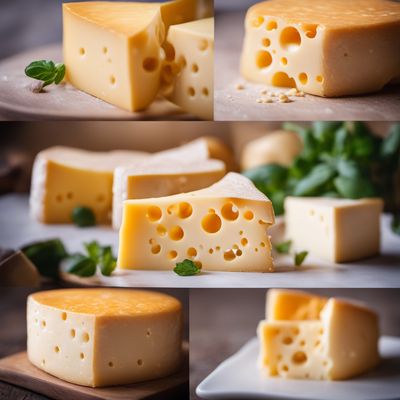
Ingredient
Cheese, bra
Bra Cheese: A Savory Delight
Bra cheese is a semi-hard cheese made from cow's milk. It has a pale yellow color and a smooth, creamy texture. The flavor of bra cheese is rich and nutty, with a slightly sweet and tangy undertone. Its creamy texture makes it perfect for melting, making it an excellent choice for pizzas, pasta dishes, and grilled sandwiches. It pairs well with fruits, nuts, and cured meats, making it a versatile ingredient in both sweet and savory recipes.
Origins and history
Bra cheese originated in the town of Bra in the Piedmont region of Italy. It has a long history that dates back to the Roman era, where it was made by local shepherds. Over the centuries, the cheese-making techniques have been refined, resulting in the delicious cheese we know today. Bra cheese is deeply rooted in Italian culinary traditions and is considered a staple in the region. It is also protected by the European Union's Protected Designation of Origin (PDO) status, ensuring its authenticity and quality.
Nutritional information
Bra cheese is a good source of calcium, protein, and vitamin B12. It is also relatively high in fat and calories, so it should be consumed in moderation as part of a balanced diet.
Allergens
Bra cheese may contain lactose and is not suitable for individuals with lactose intolerance or milk allergies.
How to select
When selecting bra cheese, look for a cheese that is firm to the touch with a smooth and even rind. Avoid cheeses with any signs of mold or discoloration. Opt for cheeses that have been aged for at least a few months for a more pronounced flavor.
Storage recommendations
To maintain the freshness and quality of bra cheese, it should be stored in the refrigerator. Keep it wrapped in wax paper or parchment paper to allow it to breathe. Avoid storing it in plastic wrap, as it can cause the cheese to sweat and develop off-flavors. Use the cheese within a week of opening for the best taste.
How to produce
Bra cheese is typically produced by experienced cheesemakers using traditional methods. It involves the curdling of cow's milk, followed by the aging process to develop its distinct flavor and texture. Producing bra cheese at home requires specialized equipment and knowledge, so it is best left to the experts.
Preparation tips
Bra cheese can be enjoyed on its own as a part of a cheese platter or paired with fruits, nuts, and cured meats. It is also commonly used in Italian dishes such as pasta, risotto, and pizza. Its creamy texture makes it perfect for melting, adding a rich and savory flavor to dishes. Additionally, it can be grated over salads or used as a filling for sandwiches and wraps.
Substitutions
Bra cheese is commonly available in Italy and can be found in specialty cheese shops or gourmet food stores around the world.
Availability
Italy
More ingredients from this category » Browse all

Cheese, passendale
Passendale: The Belgian Delight

Cheese, edam
The Dutch Delight: Edam Cheese

Cheese, tete de moine
The Art of Swiss Cheese

Cheese, lubelski
The Creamy Delight: Exploring the Richness of Lubelski Cheese

Cheese, Monterey Jack
Monterey Jack: The Creamy Delight

Cheese, turunmaa
Turunmaa: The Finnish Delight

Cheese, smoked gouda
Smokey Dutch Delight

Cheese, jarlsberg
The Norwegian Delight

Cheese, morbier
Morbier: The Creamy Delight from the Jura Mountains

Cheese, nokkelost
"Nokkelost: The Spiced Delight of Scandinavian Cheeses"

Cheese, caerphilly
Caerphilly Cheese: A Creamy Delight from Wales

Cheese, trappist
The Monastic Delight